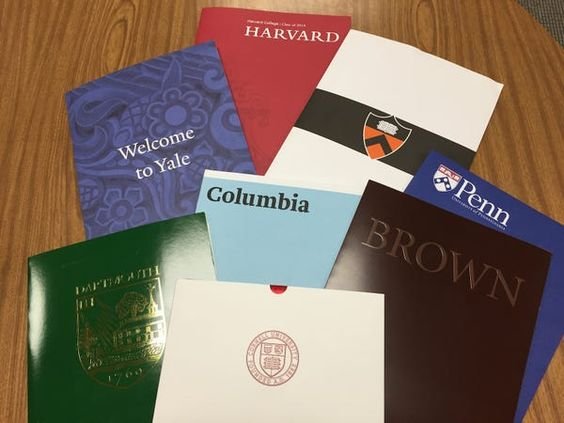“Understanding Ivy League Acceptance Rates: Insights for Aspiring International Students | IVS Solutions”
October 29, 2024 | by payment.ivssolutions@gmail.com

When it comes to pursuing higher education in the United States, Ivy League colleges hold a unique appeal. Known for their prestigious reputation, rigorous academics, and strong alumni networks, these institutions are dream destinations for many international students. However, with top-tier reputation comes selectivity, and Ivy League colleges are famously competitive. For students aiming to navigate the admissions process effectively, understanding the acceptance rates of each Ivy League school is key.
What Makes Ivy League Colleges So Selective?
The Ivy League comprises eight prestigious schools: Harvard University, Yale University, Princeton University, Columbia University, Brown University, Dartmouth College, University of Pennsylvania, and Cornell University. Each of these institutions has a long history of academic excellence, cutting-edge research, and influential alumni. Because of their popularity among high-achieving students worldwide, Ivy League colleges receive tens of thousands of applications each year but offer only a limited number of seats, making acceptance highly competitive.
Ivy League Acceptance Rates: A Closer Look
Each Ivy League school has its own unique acceptance rate, influenced by factors such as application volume, legacy admissions, and institutional priorities. Here’s a breakdown of recent acceptance rates to help you understand the competitiveness of each school.
1. Harvard University
- Acceptance Rate: Around 3.4%
- Highlights: Known for its global reputation and legacy of producing leaders across industries, Harvard is one of the most selective colleges in the world. This low acceptance rate reflects the high standards and vast pool of applicants, especially from international backgrounds.
2. Columbia University
- Acceptance Rate: Approximately 3.9%
- Highlights: Located in the heart of New York City, Columbia attracts students interested in urban studies, media, and business. The city’s advantages, combined with Columbia’s prestige, contribute to its competitive admissions.
3. Princeton University
- Acceptance Rate: Roughly 4.4%
- Highlights: With a focus on undergraduate education, Princeton has a slightly higher acceptance rate than Harvard and Columbia, but it’s still extremely competitive. Its strong research programs and beautiful campus are major attractions.
4. Yale University
- Acceptance Rate: Around 4.6%
- Highlights: Known for its strong humanities programs and social sciences, Yale remains highly selective, with applicants vying for a place in its well-rounded academic programs and vibrant campus community.
5. Brown University
- Acceptance Rate: About 5.5%
- Highlights: Brown’s open curriculum, which allows students to create their academic path, makes it a popular choice for those seeking flexibility. Its admissions process, while slightly more lenient than some peers, is still highly competitive.
6. University of Pennsylvania (UPenn)
- Acceptance Rate: Close to 5.9%
- Highlights: UPenn’s business-focused Wharton School attracts many aspiring business professionals, making it a top choice for those interested in finance and entrepreneurship.
7. Dartmouth College
- Acceptance Rate: Roughly 6.2%
- Highlights: Known for its tight-knit community and liberal arts approach, Dartmouth’s slightly higher acceptance rate provides a marginally greater chance for applicants.
8. Cornell University
- Acceptance Rate: Approximately 8.7%
- Highlights: Cornell has the highest acceptance rate among the Ivies, making it the least selective of the group. However, it remains extremely competitive, especially for certain programs like engineering and architecture.
How to Improve Your Chances of Acceptance
Given these low acceptance rates, gaining admission to an Ivy League college requires careful preparation. Here are some actionable tips for prospective international students:
- Academic Excellence: Ivy League schools place high importance on academic performance, so maintaining a strong GPA and performing well on standardized tests is essential.
- Extracurricular Activities: Ivy League admissions committees value leadership, commitment, and impact. Engage in meaningful extracurricular activities, volunteer work, and unique projects to demonstrate your strengths.
- Unique Personal Statement: A compelling personal statement that conveys your story, ambitions, and fit for the school can set you apart from other applicants.
- Strong Recommendations: Letters of recommendation from teachers or mentors who can speak to your academic and personal qualities are crucial. Choose individuals who know you well and can highlight your strengths.
- Consider Early Decision: Applying through an early decision or early action plan can sometimes improve your chances, though it requires a firm commitment to attend if accepted.
Conclusion
The acceptance rates of Ivy League colleges underscore their exclusivity, making them among the most competitive universities in the world. For international students, understanding these figures can help set realistic expectations and motivate them to prepare comprehensively. With a strong application strategy, students can navigate the admissions process with confidence.
At IVS Solutions, we support students every step of the way, from application strategy to interview preparation. Contact us to learn how we can help you achieve your Ivy League dreams.
RELATED POSTS
View all


